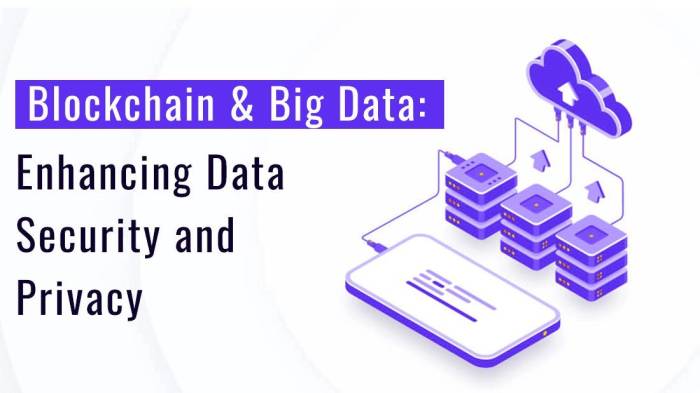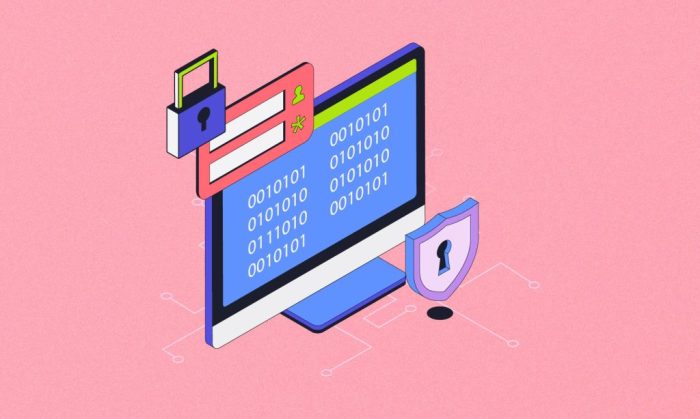Kicking off with How Blockchain Technology Can Improve Data Privacy, this opening paragraph is designed to captivate and engage the readers, setting the tone american high school hip style that unfolds with each word.
Blockchain technology is not just a buzzword anymore; it’s a game-changer in the realm of data privacy. With cyber threats on the rise, protecting sensitive information has never been more crucial. Let’s dive into how blockchain is reshaping the landscape of data security and privacy in a fresh and innovative way.
Overview of Blockchain Technology: How Blockchain Technology Can Improve Data Privacy
Blockchain technology is a decentralized, distributed ledger that securely records transactions across a network of computers. Each transaction is added as a “block” to a chain of transactions, creating a permanent and transparent record that cannot be altered retroactively.
Key Features of Blockchain Technology
- Decentralization: No single entity has control over the network, making it resistant to tampering or censorship.
- Transparency: All participants in the network can view the entire transaction history, promoting trust and accountability.
- Immutability: Once a block is added to the chain, it cannot be changed, ensuring the integrity of the data.
- Security: Transactions are encrypted and linked to previous transactions, making it extremely difficult for hackers to alter the data.
Examples of Industries Using Blockchain, How Blockchain Technology Can Improve Data Privacy
- Finance: Blockchain is widely used in banking and finance for secure and fast cross-border payments, smart contracts, and trade finance.
- Supply Chain Management: Companies use blockchain to track and verify the authenticity of products throughout the supply chain, reducing fraud and improving transparency.
- Healthcare: Blockchain is used to securely store and share patient records, ensuring data privacy and interoperability between healthcare providers.
Importance of Data Privacy

In today’s digital age, data privacy plays a crucial role in safeguarding sensitive information from unauthorized access or misuse. With the increasing reliance on technology for various aspects of our lives, protecting personal data has become more critical than ever.
Data breaches and lack of privacy protection can lead to severe consequences for individuals, businesses, and even governments. Cybercriminals can exploit vulnerabilities in data security systems to steal personal information, financial details, and other sensitive data, resulting in identity theft, financial loss, and reputational damage.
According to a report by IBM Security, the average cost of a data breach in the United States is $8.64 million, making it essential for organizations to invest in robust data privacy measures. Additionally, the General Data Protection Regulation (GDPR) in Europe has enforced strict rules on data protection, highlighting the global importance of safeguarding personal information.
Risks of Data Breaches
- Data breaches can lead to identity theft and financial fraud, putting individuals at risk of significant financial loss.
- Loss of customer trust and reputation damage can occur when businesses fail to protect sensitive data, leading to potential lawsuits and regulatory fines.
- Government agencies are also vulnerable to data breaches, jeopardizing national security and public trust in institutions.
How Blockchain Enhances Data Privacy

Blockchain technology plays a crucial role in enhancing data privacy by ensuring data integrity and security. Let’s dive into how blockchain achieves this and explore some examples of its applications that have improved data privacy.
Ensuring Data Integrity and Security
- Blockchain uses cryptographic techniques to secure data, making it tamper-proof and immutable. Each block contains a unique hash that links it to the previous block, creating a chain of blocks, hence the term “blockchain.”
- By decentralizing data storage and processing, blockchain eliminates the need for a central authority, reducing the risk of data breaches or unauthorized access.
- Consensus mechanisms like Proof of Work or Proof of Stake ensure that transactions are validated and added to the blockchain in a transparent and secure manner, enhancing data integrity.
Role of Decentralization in Improving Data Privacy
- Decentralization distributes data across a network of nodes, making it difficult for hackers to compromise the entire system. This distributed nature enhances data privacy by reducing the vulnerability of a single point of failure.
- Users have more control over their data in a decentralized system, as they can access, manage, and share their information without relying on intermediaries.
- Smart contracts, self-executing contracts with predefined rules, can automate data handling processes while ensuring privacy and security through cryptographic encryption.
Examples of Blockchain Applications Enhancing Data Privacy
- Healthcare: Blockchain is used to securely store and share patients’ medical records, ensuring data privacy and integrity while enabling seamless access for authorized healthcare providers.
- Supply Chain Management: Blockchain enables transparent and secure tracking of goods throughout the supply chain, reducing the risk of data manipulation and ensuring the authenticity of products.
- Identity Management: Blockchain-based identity solutions offer a secure and decentralized way to verify identities without exposing sensitive personal information, enhancing privacy protection.
Transparency and Trust in Data Transactions

Blockchain technology plays a crucial role in promoting transparency and trust in data transactions by providing a secure and decentralized platform for recording and verifying information. The concept of immutability further enhances trust by ensuring that once data is recorded on the blockchain, it cannot be altered or tampered with.
Immutability and Trust
Immutability is the characteristic of blockchain that ensures data once entered cannot be changed or deleted.
- Immutability eliminates the risk of fraudulent activities and unauthorized changes to data, increasing trust among parties involved in data transactions.
- This feature ensures that the integrity of the data remains intact, providing a reliable and secure environment for exchanging information.
- By leveraging immutability, blockchain technology enhances accountability and transparency in data transactions, thereby fostering trust among users.
Use Cases of Increased Trust in Data Exchange
Blockchain has been successfully implemented in various industries to improve trust in data transactions.
- In supply chain management, blockchain ensures transparency and traceability of products, reducing the risk of counterfeit goods and enhancing trust among stakeholders.
- In healthcare, blockchain secures patient data and provides a tamper-proof record of medical history, boosting trust between patients and healthcare providers.
- For financial transactions, blockchain enables secure and transparent peer-to-peer transactions, reducing the reliance on intermediaries and enhancing trust between parties.


